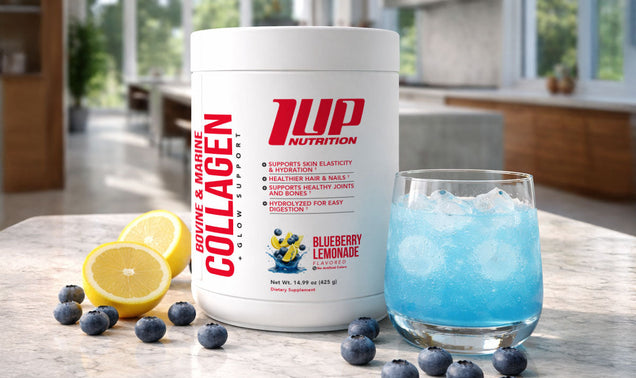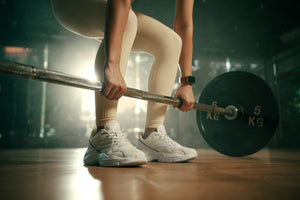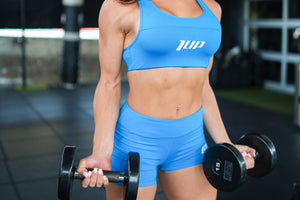So often we tend to think that if a little of something is good, then more of it should be that much better. Nowhere is this mindset more prevalent in the world of fitness.
With slogans such as “no pain, no gain” and “#nodaysoff”, it can incredibly easy for newcomers to the gym to think that they have to dedicate hours and hours of their week to getting lean, toned, and strong.
But the truth is, as with many situations in life, more is not always better.
In fact, a short workout performed with laser focus and all-out intensity will always beat a long workout lacking intensity, focus, and drive.
In other words, just because you’re in the gym for 2 hours, 5 days per week doesn’t mean you’re going to have better results than someone who trains 5 times per week for 45 minutes at a time.
And that brings us to the point of today’s post -- the length of a workout is not the sole marker of whether it is “good” or effective.
The length of a workout is but one of many factors that decides whether your workout is good or not.
So, How Long Should I Workout?
That’s going to depend on a lot of things.
The length of your workout hinges on several other factors, including:
- Intensity of workout (you can train long or you can train hard, but you can’t do both at the same time)
- Training Experience (more experienced lifters are usually able to better handle longer workouts while maintaining high levels of performance)
- Goals
- Age
- How much time can you dedicate to training?
- The structure of your workouts (circuit training, supersets, straight sets, etc.)
- Equipment availability (if the gym is very crowded you may have to wait a bit longer than usual to use certain equipment)
- “Wasted” workout time (how many times you snap selfies, check instagram/facebook, and text during your workout)
Furthermore, how are we quantifying the time you spend in your workout?
Does the clock start from the moment you walk into the gym and end when you leave, or does it start after you’ve performed your warm up and get into your working sets. Or does it only constitute the actual time you’re lifting weights?
As you can see, this makes it very difficult to pinpoint how long a workout “should” last.
In reality, there is no such thing as the ideal or perfect length of time your workout should last.
There are simply too factors at play and too many differences between one individual to another to give a blanket recommendation across the board. Not every workout (or even every exercises) is suitable for every person in every instance.
And, as we said before, the length of your workout doesn’t really say much in regards to the quality of your workout.
If you are in the gym for 2 hours training, but in between every set you’re scrolling through instagram/facebook profiles for 10 minutes, are you really training with intensity, drive, and determination, or are you just screwing around in between sets?
While this example is a bit of an over-exaggeration, it’s not the far from what we see lots of people doing in the gym, which brings us back to our original point -- just because you’re in the gym for a long time doesn’t mean you’re training hard or effectively.
The simple truth of the matter is, you shouldn’t be concerned with how long your workout lasts. What you should be concerned with is getting in the gym and putting in quality work, devoting 100% of your attention, focus, and effort into every rep of every set.
When you adopt this mindset, you won’t be concerned with how long you’re in the gym but how well you performed in your training session.
Were you able to perform more reps this week than last week?
Were you able to lift more weight this week than last week?
Were you able to lift the same amount of weight as last week but with less rest between sets?
These are far more important things to consider in your training program than how long you are in the gym.
That being said, the one instance you should be concerned about the length of your workout is if you’re under a severe time-crunch. And, if that’s the case, you really better be on your A-game in terms of sticking to your training program, getting in the gym, putting in the work, and getting out ASAP.
Use the rest of your time to recover, relax, and spend time with family, friends, and loved ones
What About Cortisol?
One of the biggest myths circulating around the fitness industry is that your workout should not last more than 45-60 minutes, as it could lead to excessive cortisol productions, which impairs muscle growth.
This simply isn’t true.
It’s not as though your body has a magical timer in it that recognizes when you’ve been in the gym for over 60 minutes and starts blasting cortisol all of the place. Physiology isn’t that simple.
Plus, studies have shown that short, intense workouts can elevate cortisol levels just as much as long workouts.[1,2]
OK, So How Long My Workout Last?
Speaking in broad terms, and with the understanding that different goals will require different levels of commitment to time spent in the gym…
- If you want to build muscle, expect to spend at least 3-5 days in the gym for roughly 60 minutes each time of actual lifting.
- If you want to lose fat, add an additional 3-4 hours of cardio to your 3-5 hours of resistance-training.
Takeaway
There’s a lot of bad information circulating in fitness circles regarding how long your workout should be. Truth be told, “good” workouts can be as brief as 20 minutes and as long as 90+ minutes, depending on your training age, experience, programming, and intensity.
The only time you need to be concerned with the length of your workout is when you’re faced with time constraints. And if that’s the case, you should be so much focused on how long you have to train, but how much high-quality workout you can get done.
In end, so long as you’re hitting the gym 3-5 days per week using compound exercises and focusing on making every set count, you will get the body you’ve always wanted.
REFERENCES
- Kraemer WJ, Fleck SJ, Dziados JE, Harman EA, Marchitelli LJ, Gordon SE, Mello R, Frykman PN, Koziris LP, Triplett NT. Changes in hormonal concentrations after different heavy-resistance exercise protocols in women. J Appl Physiol. 1993; 75:594-604.
- Kraemer WJ, Dziados JE, Harman EA, Marchitelli LJ, Gordon SE, Mello R, Frykman PN, Koziris LP, Triplett NT. Effects of different heavy-resistance exercise protocols on plasma beta-endorphin concentrations. J Appl Physiol. 1993; 74:450-9.






